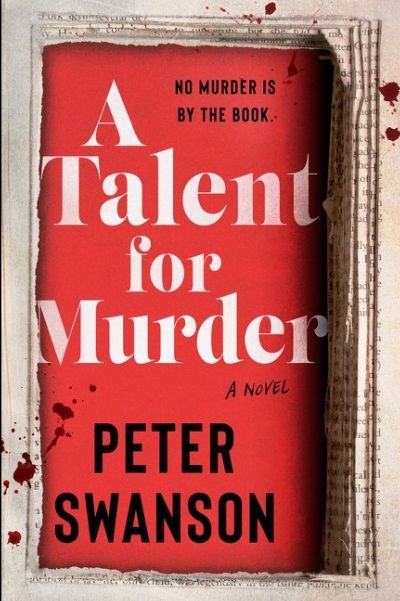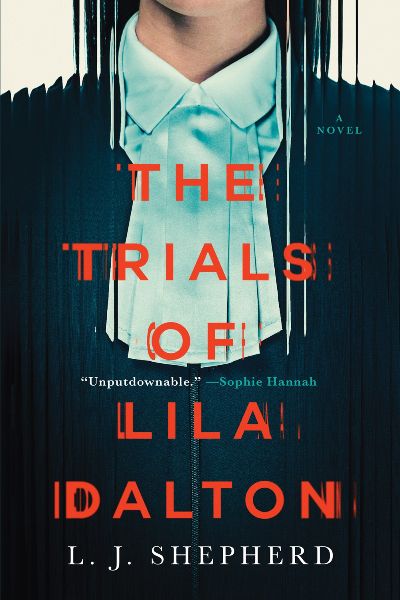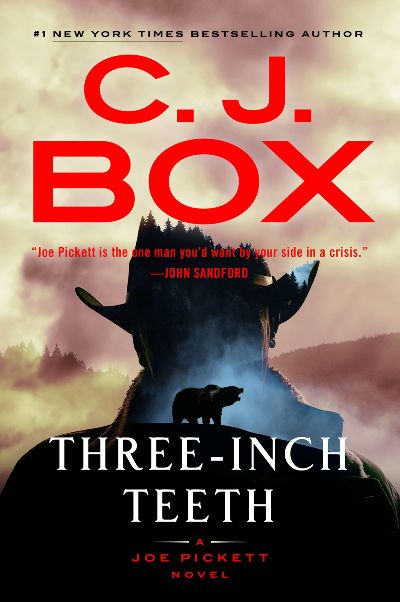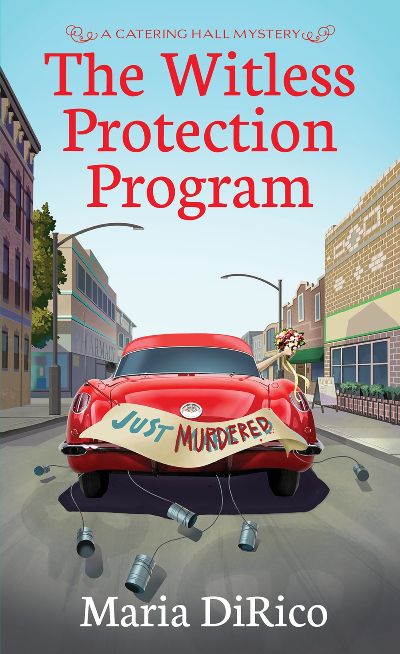What the world needs now is more Robert Thorogood and the three heroes of the Marlow Murder Club: Judith the crossword-puzzle author, Suzie the dogwalker, and Becks the vicar’s wife. This romp starts off with the Mayor keeling over at a planning meeting—lucky for us, Suzie happens to be attending—and the cause of death is soon determined to be poison in his coffee. Aconite, to be specific, the queen of all poisons. But who would kill the beloved Mayor? Before the ladies can begin their investigation, Tanika—a police officer in the earlier books and now detective inspector—appoints them as “civilian advisors,” a clear case of “if you can’t beat them, join them.” While traversing Marlow in search of the murderer is loads of fun, the real joy in this series is the dialog, wit, and friendships of the women. This is nothing less than the ultimate in cozies.
Review
It’s great when a series keeps getting better and better, and this latest in the “Vet Mystery” series does exactly that. Veterinarian Peter Bannerman is on vacation with his family in northern Manitoba—lots of hiking and canoeing, mosquitos and dogs. But things quickly go wrong. The gorgeous sled huskies owned by the proprietor of the lodge are poisoned. Then a floatplane crashes into the lake; the pilot, it turns out, has been shot from the ground on the plane’s descent. And if human misbehavior weren’t enough, nature provides a terrifying forest fire that nearly kills the Bannerman family. They seek safety in the lodge along with the other tourists and staff. Here Schott’s (Fifty-Four Pigs) book turns into a locked-room tale as the outside world grows more fearsome while it becomes clearer that the murderer is likely in their midst. Wonderful, unique characters (including Peter’s sniffer dog, Pippin), a dramatic setting, and a brisk plot all make for an excellent mystery.
At first, Finding Mr. Write reads like hearty rom-com fare: Daphne McFadden, a struggling writer who can’t get an agent, hires a dishy man to pose as the author of her book. She wants to hate “Zane Remington” but can’t, and complications ensue, not to mention increasingly lingering looks. While the enjoyable rom-com type misunderstandings and drama continue throughout the book, there’s also more here. Crime and mystery come into play when Daphne’s publisher and the book’s rabid fans get ever closer to finding out that Zane isn’t really the author of the wildly popular “dark zombie thriller with a teen girl protagonist,” and Daphne worries about her legal future. There’s also a lot to absorb about the economics, biases, and general messed-up-edness of the publishing industry, with an overworked publicist, one in a long string of underpaid young women, one of the tale’s quiet heroes. This well-plotted look at a maybe-romance and the bizarro world writers inhabit is a fun mix of mystery and romance, and well worth a read.
There were so many times when I wanted to yell DON’T DO THAT! at the characters in this dark tale of trying to do right by the ones you love but being tripped up by hapless choices at every turn. The cast is stuck, in various ways, in the orbit of the ruthless Winters crime family. Melissa Cruz, who’s “[smothering] her guilt in justification and Xanax,” is running from an abusive relationship with a member of the family, accompanied by her real love. The Winterses are not taking this betrayal lightly, and they’ve sent Lucky Wilson to find the couple and…well, Lucky is a professional assassin, even if his day job is real estate, so things don’t look good. Then there’s Lucky’s family: his wife, who he believes is having an affair, and his teenage daughter, who’s very much not into boys her own age. The fast-moving and sometimes-comic tale unfolds the back stories of the various characters, beautifully illustrating how bad decisions can be the product of fierce love and how what seems like the worst path might be a redemption. While waiting for this book, you’ll want to go back and try Aymar’s No Home for Killers and They’re Gone, as his writing is just great.
Dugoni (One Last Kill, Her Deadly Game) takes a detour into Seattle’s past in his latest legal thriller. In 1933, in a world worried about the rise of a German Chancellor named Adolf Hitler and the United States feeling the crunch of the Great Depression, a young man named William “Shoe” Shumacher leaves home to take a position at one of Seattle’s newspapers. Shoe receives assistance from a homicide detective and is given special access to a murder at a social club. A former boxer named Frankie Ray is killed by the club owner, George Miller, who claims self-defense. Shoe begins to suspect there is more to the story as he writes his daily updates for the Seattle Daily Star. Dugoni juggles a compelling crime story with a sweet romantic tale as Shoe falls for a young woman who works at a bakery, and they begin to fall in love, even as he spends every day in the courtroom watching the case unfold. The case is compelling, the characters are stellar, and the prose takes the reader back to a time when DNA and technology were not available to make a slam-dunk prosecution. Is it too early to say that this will be remembered as the best legal thriller of the year?
Librarian Martha Ratliff doesn’t expect to marry—isn’t running a public library in Maine satisfying enough?—until she meets Alan. A traveling salesman, Alan sells novelty items like t-shirts (“Math teachers aren’t mean. They’re above average”) at academic conferences. But as sweet as Alan might be, there’s something a bit off. Martha can’t help but do a little research, only to discover that five of the cities Alan visited have unsolved cases of murdered women, with all killed during Alan’s stay. Coincidence? Add to this the blood she finds on one of his dress shirts and Martha’s on the phone to Lily Kinter, a buddy from library school who helped Martha escape from an abusive boyfriend years ago. Could Martha be married to a serial killer? But Lily has her own baggage, and what started as a simple mystery explodes into a fascinating, dark, and complex novel of suspense. Every true-crime reader will find something to appreciate in this hugely inventive novel.
This brilliantly disorienting debut takes place on Assumption Island, a cold, rocky British outpost in the north Atlantic. Lila Dalton finds herself in an island courtroom being addressed by an impatient judge who clearly expects her to argue for her client. Lila has no idea how she got to this courtroom, how to be a barrister, what the case is…she doesn’t know anything, including who the stranger in the mirror is. Things take a turn for the (even) worse when she gets anonymous notes telling her that she’d better win acquittal for the murderer she’s representing if she ever wants to see her daughter again (that would be the daughter she didn’t know she had). The various characters working for and against Lila (we’re often unsure which direction a character is leaning, adding to the dark, compelling tale) are well drawn, with each adding complications and drama. Spare but gripping dialog propels the strange story to an appropriately dizzying conclusion. For fans of Hervé Le Tellier’s The Anomaly.
This sequel to the Northern Ireland-set Northern Spy (2021), in which Tessa Daly desperately searches for her sister, Marion, who has either been kidnapped by the IRA to work for them or is actually a terrorist, finds Tessa hiding in Dublin from the terrorists who want revenge. She’s enjoying a quiet, if lonely, life with her four-year-old son when she’s kidnapped by a gang that includes a childhood friend. He’s now in the IRA and wants Tessa’s help to turn an MI5 agent toward the Republican side. That starts a terrifying ordeal for Tessa, who walks a tightrope between British officialdom and homegrown extremists while keeping her son safe and pursuing a forbidden romance. As in the previous book, Berry portrays a modern Ireland that’s a maelstrom of contradictions, grief for the past and hope for the future, and fear that the country’s core can never really change. But there’s still hope for the Daly family, whose caring and exasperation toward one another makes this local drama into a universal fable of love overcoming all.
Wyoming game warden Joe Pickett learns of a tragedy that hits home. It appears that a grizzly bear has attacked and killed his daughter’s potential fiancée. A search ensues to capture this rogue animal, and meanwhile, Dallas Cates, a man who blames Pickett for imprisoning him and destroying his family, is released. Cates has an agenda: to kill the people who wronged him, and at the top of the list is Pickett and Pickett’s friend, Nate Romanowski. Inspired by the bear attack, Cates creates a mechanical device that leaves victims looking as though a bear mauled them. The prison officials promised to alert Pickett when Cates was released, but in the wake of the carnage, they forget. Can the warden figure out his nemesis’s plan before it’s too late? Box has created a series with rich and diverse characters whom readers have grown to love, and his latest is one of his best. At times brutal and shocking, and with an ending that will have readers demanding the next one immediately, Three-Inch Teeth will top bestseller lists.
Mia Carina is living her best life, as the kids say. Her family’s catering hall in Queens, NY is both hugely successful and, with her acumen, now a fully legitimate business (the Family hasn’t always played above board). Shane, the love of her life, has finally proposed (Mia’s one tough lady, although when it comes to Shane, her knees get weak). But then she catches sight of a man who very much looks like Adam Grosso, her presumed-dead husband. Could she be wrong? Possibly, but a second sighting of the no-good SOB confirms he’s alive, which means Mia and Shane will have to delay their wedding—which they refuse to do. Mia calls an emergency meeting of family and Family—capisce?—to remove Adam, just not kill him (“My goal is to be a divorcee, not a widow. Ya got it?”). While finding Adam takes up a good chunk of the book, there are several fun subplots, not to mention an incredible cast of characters. Normally I’d worry about telling them apart, but DiRico manages to give each a strong identity, starting with our lead, Mia the Magnificent. Yes, it’s the fifth book in the series, but feel free to jump in. You won’t regret it.










